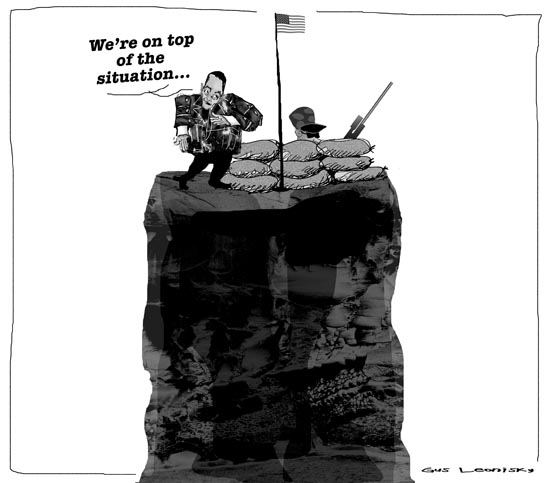Search
Recent comments
- wanton barbarism....
6 hours 13 min ago - little nazi....
8 hours 18 min ago - arm-wrestling....
8 hours 44 min ago - decision.....
8 hours 47 min ago - unhinged....
11 hours 26 min ago - nasty frog....
11 hours 36 min ago - words....
11 hours 44 min ago - The Seth Rich Question 15
12 hours 10 min ago - very serious....
12 hours 22 min ago - propaganda....
12 hours 27 min ago
Democracy Links
Member's Off-site Blogs
a big F for effort...

The full exit strategy in Afghanistan will presumably involve a big effort to create a sense that Nato forces have the upper hand.
--------------------
The generals know that the Afghan army will not be up to the necessary level in terms of numbers and training until around 2014.
Exit strategy
But that will be well after the next US presidential election, in 2012, and uncomfortably close to the next British election in 2015.
Both President Barack Obama and British Prime Minister David Cameron will need to see results in good time before their respective deadlines.
The man who is in charge of the military end-game in Afghanistan, General David Petraeus, will clearly use some of the tactics that enabled him to extract the United States from its quagmire in Iraq.
He is already planning to use local, irregular forces to help fight the Taliban.
They provide a basic platform of resistance, which will make things difficult for the insurgents, though it is hard to know if they will represent a long-term proposition as a fighting force.
It is still too early to be certain what Gen Petraeus's full strategy will be. It will be very hard to replicate the effects of the surge in Iraq that enabled him to reduce the level of bombings and killings there.
Still, the full exit strategy in Afghanistan will presumably involve a big effort to create a sense that Nato forces have the upper hand.
- By Gus Leonisky at 16 Jul 2010 - 9:21am
- Gus Leonisky's blog
- Login or register to post comments
cold and hungry...
The killing of three British soldiers by a member of the Afghan national army (ANA) may not tell us much about the success of the Taliban but it says a lot about the shortcomings of security sector reform in Afghanistan.
Recruits to the ANA go through basic training that is often delivered haphazardly, with the focus on the art of war rather than the ethics of war. After basic training there is an undue emphasis on mentoring by the international forces. The proximity between the mentoring armies and the ANA shows Afghan soldiers the mentoring army's work conditions and comparisons are always drawn. ANA members believe they are hard done by, particularly as earning a living as a soldier is marred by late payment and pay rises that never arrive.
Once in combat, the ANA, Afghan police and the international forces continue to work closely in one sense and worlds apart in another. I spoke with one ANA member who was stationed in southern Afghanistan. He spent his days being mentored by the Americans and saw their secure accommodation, complete with cafeterias and state-of-the-art equipment.
At night, the Americans would go to their fortress while the ANA took charge, eating food donated from the public because their ration money was late, collecting guns from their dead comrades as they were so ill-equipped, and sleeping in the cold.
playing for both sides...
Julian Assange's remarkable service to truth, transparency and democracy are appreciated on the ground in Afghanistan. Yet there was little in the WikiLeaks revelations that came as a surprise to Afghans and the local media mostly refrained from commenting, limiting their effort to reporting news of the publication of secret files.
Only a few papers tried to take a clear stance in reaction to the story. This silence could be interpreted in different ways. Given that the WikiLeaks revelations primarily compromise Afghanistan's key ally in Washington by showing that the US army has little regard for civilian casualties, the papers might have feared backlash by the Kabul administration and hence refrained from comment to avoid confrontation. Alternatively, the silence might have a mundane explanation: nothing in the published secret files was news to Afghans.
If anything, the WikiLeaks files substantiated Afghan authorities' much-repeated concern that the neighbouring states played a key role in systematically undermining Nato's efforts in Afghanistan.
In the words of presidential spokesman Wahid Omer, "the sheer number of the reports might be surprising, but not so their content". The spokesman added: "There are two issues that appear repeatedly in the secret files and that are a matter of concern to us: the issue of civilian casualties and the role of the Pakistani intelligence ISI in actively undermining stability in Afghanistan."